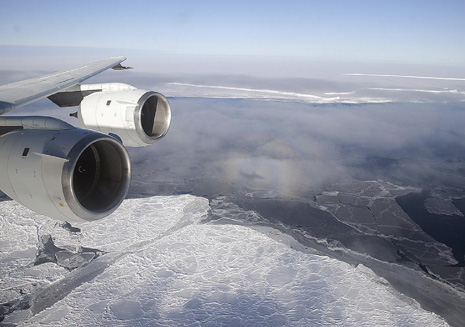This week, glaciologists report the massive floating ice shelves that form a fringe along the continent’s coastline are also deteriorating. For hundreds of thousands of years, these shelves have served as doorstops for the entire Antarctic ice sheet system, holding back millions of cubic miles of glaciers from surging toward the sea. And now they’re losing heft faster than they can be replenished.
In a study published in the March 27 issue of the journal Science, researchers from the Scripps Institution of Oceanography at the University of California at San Diego found that Antarctic ice shelves have been losing volume at an increasing pace in the past 18 years.
Most of the deterioration has happened in West Antarctica, where losses accelerated 70 percent in the past decade, the study said. In two particularly vulnerable regions, the shelves are 18 percent thinner than they were in 1994. Continent-wide, average volume change accelerated from “negligible loss” between 1994 and 2003 to “rapid loss” of around 300 cubic kilometers per year between 2003 and 2012. (That’s nearly 10 times the volume of Lake Mead, the reservoir for the Hoover Dam.)
Under current rates of thinning, researchers estimate the ice shelves holding back unstable glaciers in West Antarctica could lose half their volume within the next two centuries.
In and of itself, the loss of shelf volume is not problematic — these floating sheets of ice are continually fraying as the ocean washes up against them. It’s part of a natural process that keeps glaciers balanced. Glaciers gain mass from snowfall packed into ice over time, and lose it at their fringes via ice shelf melt and iceberg calving.
But amid all that flux, the shelves’ overall volume ought to stay the same, study co-author Helen Amanda Fricker told Scientific American. That they have lost so much of their bulk indicates something is out of balance. It’s likely the ice shelves are being eaten away from above by warmer air and from below by the warming waters they float on, and they’re not being replenished fast enough by “grounded” ice behind them.
The study is based on analysis of satellite images from the European Space Agency, and researchers cautioned that both the short time span of the observations and the distance from which they were taken mean that it’s difficult to draw conclusions about the causes and implications of the change.
“While it is fair to say that we’re seeing the ice shelves responding to climate change, we don’t believe there is enough evidence to directly relate recent ice shelf losses specifically to changes in global temperature,” Fricker said in an interview with Reuters.
And unlike the loss of grounded glacial ice, melting ice shelves don’t contribute to global sea level rise because they’re already floating in the water.
“This is just like your glass of gin and tonic. When the ice cubes melt, the level of liquid in the glass does not rise,” the study’s lead author, Fernando Paolo, told Reuters.
But if the continent’s ice shelves continue to deteriorate, it could have dramatic consequences for the world’s oceans. Fricker described the shelves as “buttressing” the glacial ice behind them. They separate glaciers, which are actually incredibly slow moving rivers of ice, from the warm ocean waters that would erode them.
“Thinning of an ice shelf reduces this effect, leading to an increase in ice discharge to the ocean,” Paolo and Fricker assert in their study.
Though the loss of floating shelf ice won’t create a rise in sea levels, the suddenly inexorable flow of glacial ice into the ocean certainly would.
“That’s a key concern from our new study,” Fricker said.
More about:
















































